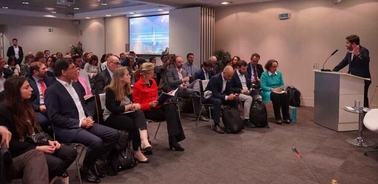- Home
- News And Events
- News
- Companies With Social Or Environmental Impact Represent More Than 6% Of Ibero-american Gdp, According To Ie University And Segib Experts
Companies with social or environmental impact represent more than 6% of Ibero-American GDP, according to IE University and Segib Experts

There are more than 170,000 companies focused on this purpose, according to the report ‘Empresas con propósito: El auge del cuarto sector en Iberoamérica’.
Companies set up to make a positive social or environmental impact now represent more than 6% of Ibero-American GDP and promise to play a decisive role in achieving the 17 Sustainable Development Goals of the 2030 Agenda. This is one of the main conclusions of the study carried out by the Center for the Governance of Change (CGC) at IE University in collaboration with the Ibero-American General Secretariat (SEGIB), which analyzes the current state of the "economy with a purpose" in Argentina, Brazil, Colombia, Chile, Mexico, Portugal and Spain.
The study shows that there are more than 170,000 companies of this type in Latin America, employing more than 10 million people across a range of sectors, from agri-food to technology and that combine their commercial activity with measures aimed at combating climate change, alleviating poverty and reducing inequality. These companies come in different forms, such as cooperatives, mutuals, B corporations, triple balance companies and work in the circular economy, social entrepreneurship or responsible banking, among others.
Given their commitment to the environment and social justice, these purposeful companies could play a decisive role in achieving the 17 development goals of the 2030 Agenda. However, most of them fail to reach sufficient scale to make the impact the world needs. According to Diego Rubio, coordinator of the study, this is because there is no suitable ecosystem for them. “Once incubated, companies with purpose are forced to compete in an economic and regulatory framework that has not been created for them, but instead for traditional for-profit companies, which have to prioritize profits against impact. That is to say, the problem is not in the seed, but in the soil.”
To solve this problem, the study proposes creating a new regulatory space adapted to the unique characteristics of these companies to help them grow without having to renounce their values or desire for social impact. This space is called “the fourth sector”, because it is at the intersection of the three traditional sectors (private, public and non-profit).
“Inequality and climate change are not only government matters, but also demand a more active role from business.”
Rebeca Grynspan, Ibero-American General Secretary and co-chair of the World Economic Forum’s Fourth Sector Development Initiative, says, “People are telling us that sustainable development, inequality and climate change are not only government matters, but also demand a more active role from business.”
The study analyzes the current situation of the fourth sector in seven countries and provides a series of specific recommendations.
Diego del Alcázar Benjumea, Vice President of IE University, highlights the commitment of the academic institution to developing projects with social impact. “At IE University we train leaders to face the challenges of managing institutions and companies in a global environment transformed by technology. We work every day to achieve social impact. We have designed an educational model based on innovation and technology that eliminates the physical barriers to education, we have scholarships so that the best talent can access our training programs and we promote entrepreneurship as a way to create employment, wealth and social welfare.”